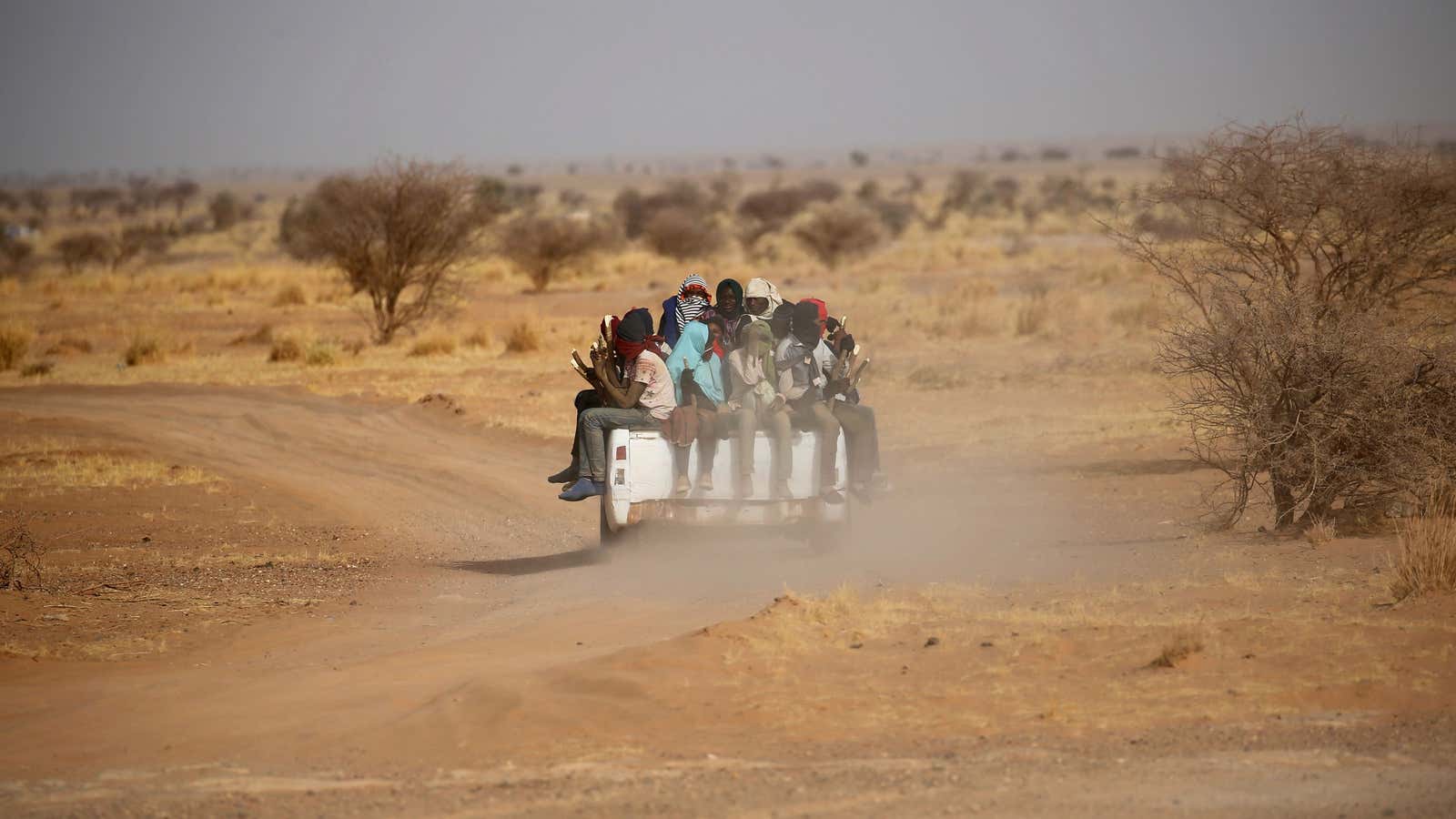If global media reports are to be believed, every person who leaves their home country in Africa is heading for Europe. That’s simply not true. 80% of Sub-Saharan migrants are merely moving between countries on the continent.
Part of these journeys involve migrating to or across the Sahara, from Mauritania to Egypt. This is not a recent phenomenon. But from the beginning of the 2000s, the media and governments have focused on the minority of people who, having crossed the Sahara, went on to cross the Mediterranean—heading for Europe.
This has led to travel within Africa being conflated with economic migration towards Europe. This is a far cry from the reality that has been observed by researchers in the field. Yet this false assumption has been used to justify the implementation of restrictive migration policies within Africa. As in the Mediterranean, travel through the Sahara is now made difficult and unnecessarily dangerous by increased levels of checks and control.
The result is that the Sahara has been transformed into a vast “frontier zone.” Here, migrants can be subjected to random checks, sorted into different administrative categories, sent back to their home countries or even arrested: anywhere and at any time. This supposedly provides an extra layer of “protection” for European countries—even though much of the migrants who receive such treatment in the Sahara region have no intention of travelling beyond the African continent.
Now Niger has emerged as Europe’s latest border guard. Restrictive laws and harsh penalties apply not only to people who actually cross an international border irregularly, but also to many people who reside in Niger legally. That includes Nigeriens who act as drivers and guides for travellers.
All of this is making travel in the region more costly, secretive, difficult and dangerous. It also flouts international conventions and human rights.
Pressure and persecution
Until recently, migration was not seen as a problem in Niger. Things changed when the European Union put pressure on Niger’s government to “break the business model of (people) smugglers.”
A huge amount of money and manpower has been poured into combating the supposed influx of illegal migrants who are allegedly all headed for Europe. For instance in 2017, the European mission EUCAP Sahel Niger opened a permanent regional office in Agadez in northern Niger.
Agadez is increasingly considered by European experts as the place most illegal migrants pass through on their way to Libya and then Europe via the central Mediterranean.
The civil programme EUCAP Sahel Niger appears to be one of the key instruments of European migration and security policy in the country. The mission’s stated aim is to assist the Nigerien national and local authorities and their security forces in developing policies, techniques and procedures “to better control and fight illegal migration,” “terrorism,” and “organized crime.”
Another instrument is the New Migration Partnership Framework. This is a collaboration between the EU and Niger, to enforce Niger’s 2015 law on migrant trafficking and smuggling.
This law is designed to “prevent and combat the illicit smuggling and trafficking of migrants.” It defines a smuggler as “any person who, intentionally and in order to gain, either direct or indirect, financial or material benefit, facilitates the illegal entry or exit of a foreign national to or from Niger.” On the ground, this law is used to indiscriminately target people who are not involved in any kind of trafficking and, sometimes, not even in smuggling.
Instantly presumed guilty
In the Agadez region (which borders Libya and Algeria), anybody who organizes passenger transport—such as drivers or guides with off-road pick-up trucks that can take around 30 passengers—can now potentially be accused of participating in “illicit migrant trafficking” and can be arrested and sentenced.
Transporting—or simply housing—foreign nationals (whether they are in an irregular situation or not) in northern Niger means risking fines of up to CFA30m ($52,800) and prison sentences of up of 30 years.
And you don’t have to be “caught in the act” to be arrested or sentenced. People driving the kinds of trucks I’ve described here are automatically considered “smugglers.” They can be arrested several hundred kilometers from any border, on the simple basis of (assumed) intent.
This means that even those drivers who are not involved in people smuggling or any illegal activities are changing their itineraries to avoid check points. The problem is that by taking more off-beat, less traveled routes, drivers not only reduce their chances of being arrested—but also of being rescued in the case of breakdowns or attacks. They also avoid pressure from their peers to treat their clients decently, thereby increasing the dangers of Saharan travel for all.
All these measures run contrary to the African Charter on Human and People’s Rights, and the Universal Declaration of Human Rights. Both stipulate that “everyone has the right to leave any country, including his own.” It also disregards the principle of the presumption of innocence, on which all major legal systems are based.
No solid figures
Recently, the International Organization for Migration has claimed that the number of migrants passing through Niger has fallen. The EU and government representatives have cited their figures as proof of their policies’ success, and reason to continue their hardline approach.
In fact, however, the figures cited only speak of those who go through checkpoints managed by the International Organization for Migration. So they do not represent the actual overall numbers of migrants. Instead, they indicate just how much migration is escaping the organization’s notice.
Translated from the French by Alice Heathwood for Fast for Word.
This article was originally published on The Conversation. Read the original article.
